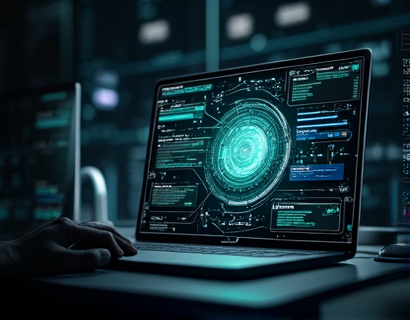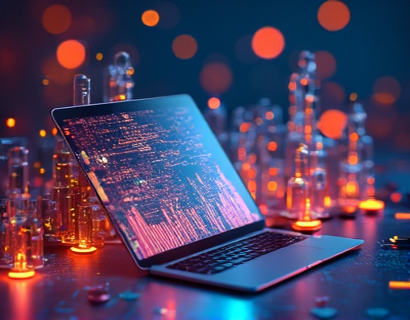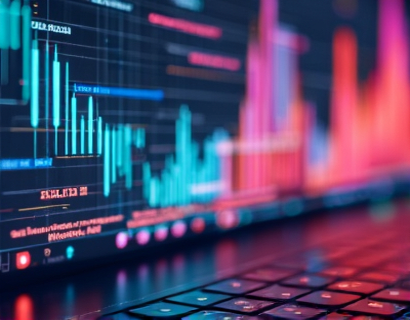Elevating Productivity and App Accessibility: The Synergy of AI and Cryptocurrency
The digital age has ushered in a transformative era where technology is redefining the boundaries of productivity and accessibility. At the forefront of this revolution is the powerful convergence of Artificial Intelligence (AI) and cryptocurrency. This synergy is not just a technological curiosity but a practical solution that streamlines tasks, enhances efficiency, and opens new avenues for tech enthusiasts and early adopters. This article delves into how AI and cryptocurrency are reshaping the digital landscape, offering cutting-edge solutions that redefine how we interact with technology.
Understanding the Intersection of AI and Cryptocurrency
To fully appreciate the impact of AI and cryptocurrency, it's essential to understand their individual roles and how they complement each other. AI, with its ability to process vast amounts of data, learn from patterns, and make decisions with minimal human intervention, has become a cornerstone of modern technology. From virtual assistants to complex data analytics, AI is ubiquitous. Cryptocurrency, on the other hand, represents a decentralized and secure form of digital currency, leveraging blockchain technology to ensure transparency and security.
The intersection of AI and cryptocurrency is particularly potent when considering the decentralized nature of cryptocurrencies. Blockchain, the underlying technology of cryptocurrencies, provides a tamper-proof ledger that can be used to create transparent, secure, and efficient systems. When AI is integrated into this ecosystem, it can optimize processes, enhance security, and provide innovative solutions that were previously unimaginable.
Enhancing Productivity with AI-Powered Tools
One of the most immediate benefits of the AI-cryptocurrency convergence is the development of advanced productivity tools. These tools leverage AI to automate routine tasks, provide intelligent recommendations, and enhance user experiences. For instance, AI-driven virtual assistants can manage schedules, prioritize tasks, and even predict user needs based on historical data. These assistants can be powered by cryptocurrencies, ensuring that transactions and data exchanges are secure and decentralized.
Another area where AI significantly boosts productivity is in data analysis. Businesses generate enormous amounts of data daily, and sifting through this data to extract actionable insights is a daunting task. AI algorithms can process and analyze this data in real-time, providing insights that can drive decision-making and improve operational efficiency. Cryptocurrencies can facilitate the monetization of these insights, creating new revenue streams for businesses and individuals alike.
Decentralized Applications and Enhanced Accessibility
Decentralized applications (dApps) are a prime example of how AI and cryptocurrency are revolutionizing app accessibility. Traditional applications rely on centralized servers, which can be vulnerable to attacks and outages. dApps, built on blockchain, offer a decentralized alternative that is more secure and resilient. AI can enhance dApps by providing intelligent interfaces, personalized user experiences, and automated maintenance.
For users, this means access to a wide range of applications without the need for intermediaries. Whether it's financial services, social networking, or content creation, dApps powered by AI can offer seamless and secure experiences. The integration of AI ensures that these applications are not only accessible but also intuitive and user-friendly, catering to a diverse audience.
Smart Contracts and Automated Transactions
Smart contracts, self-executing contracts with the terms directly written into code, are another critical component of the AI-cryptocurrency synergy. These contracts can automate complex processes, ensuring that transactions are executed precisely as agreed upon. AI can optimize smart contracts by analyzing patterns and predicting potential issues, thereby enhancing their reliability and efficiency.
In practical terms, this means that businesses can streamline their operations, reduce manual errors, and lower transaction costs. For individuals, smart contracts can simplify everything from real estate transactions to insurance claims, making these processes faster and more transparent. The use of cryptocurrencies in smart contracts ensures that all transactions are secure and immutable, adding an extra layer of trust.
Tokenization and Incentivization
Tokenization, the process of converting assets into tokens on a blockchain, is another area where AI and cryptocurrency intersect to enhance productivity and accessibility. By tokenizing assets, businesses can create liquidity, attract investment, and incentivize user engagement. AI can play a crucial role in this process by analyzing market trends, optimizing token distribution, and predicting user behavior.
For example, in the context of productivity platforms, tokens can be used to reward users for contributing value, such as creating high-quality content or providing valuable insights. AI can manage the distribution of these tokens, ensuring that the system remains fair and motivating users to continue contributing. This token-based incentivization model can significantly boost user engagement and platform growth.
Security and Privacy Enhancements
Security and privacy are paramount in the digital age, and the combination of AI and cryptocurrency offers robust solutions. Blockchain's inherent security features, combined with AI's advanced analytics, can detect and prevent fraudulent activities in real-time. AI algorithms can monitor transactions and user behavior, identifying anomalies and potential threats before they become issues.
Cryptocurrencies, with their decentralized nature, reduce the risk of single points of failure that are common in centralized systems. This makes them an attractive option for storing and transferring sensitive data. AI can further enhance security by implementing adaptive authentication methods, such as biometric verification and behavioral analysis, ensuring that only authorized users access the system.
Future Prospects and Challenges
The future of AI and cryptocurrency integration holds immense potential, but it also comes with challenges. One of the primary challenges is the regulatory landscape. As these technologies continue to evolve, governments and regulatory bodies are grappling with how to oversee and govern them. Ensuring compliance while fostering innovation is a delicate balance that requires collaboration and clear guidelines.
Another challenge is the technical complexity involved in integrating AI and cryptocurrency systems. Developers need to possess a deep understanding of both domains to create robust and efficient solutions. However, as the ecosystem matures, more tools and frameworks will become available, making it easier for developers to build innovative applications.
Despite these challenges, the benefits of AI and cryptocurrency convergence are undeniable. The potential to create more secure, efficient, and user-friendly digital solutions is vast. As more tech enthusiasts and early adopters explore these possibilities, we can expect to see a wave of transformative applications that redefine productivity and accessibility in the digital age.










































